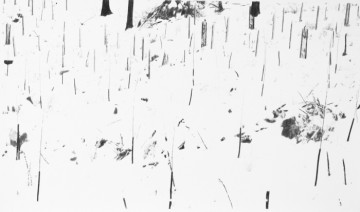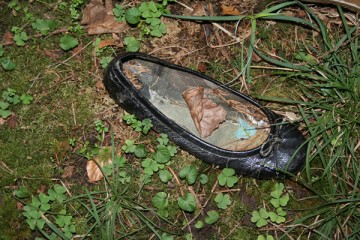Othmar Eder
DURCH DEN WALD
October 31, 2009 – December 24, 2009
On his hikes and travels to and over the mountains Eder realized that also the forest constitutes a source of inspiration. Passing through the forest, on the bike everyday when going to his studio, on summer hikes through the Alpstein massif and also in his childhood memories Eder assembles from a subjective perspective memories and findings. Filled with sounds and smells, with light and shadows he composes associative, contemplative images of what is chronologically separated. Hence, the time axis is mounted vertically and time comes to a halt.
By creating a tense, emotionally poetic atmosphere he brings out a concrete silence, like in the work with the jumper in front of a waterfall. Scenes like the one with the three skiers looking magnetized over to the other side of the valley evoke a silence before the storm. Or just like the lifeless appearing turtle, drawn in a photorealistic technique that just like an allegoric window opens onto Eder’s landscape of memories: a moment of eternity.
This excerpt from Marcel Proust’s ‘The Fugitive’ may help as a methaporic reference to Eder’s work: The days of the past slowly cover the ones that follow. But every past day remains lodged in ourselves just like in an endless huge library where of even the oldest book one sample is still on stock that probably nobody will ever ask for. But when this old day passes through the translucent layers of the later periods, rises to the surface, spreads out in ourselves and pours out over all, then the names of the past receive their old meaning again, the persons their former face, we our earlier souls. And we undergo under indefinite but bearable pains, that will not last for long, those unsolvable problems that then frightened us so much. This layering is not as rigid as of a mountain – there are always breaks that bring old layers to the surface.
Eder’s body of work is filled with memories and findings that he often uses many times and that like boulders after a long journey are brought to surface. The dialog with his own history is emotional and takes place outside of a time grid. ‘Through the Forest’ affiliates as part of the trilogy not only seamless to the first part but nourishes in the first place the stream of narrative in his work and points to the third part ‘in die Stadt’ (into the city).
By creating a tense, emotionally poetic atmosphere he brings out a concrete silence, like in the work with the jumper in front of a waterfall. Scenes like the one with the three skiers looking magnetized over to the other side of the valley evoke a silence before the storm. Or just like the lifeless appearing turtle, drawn in a photorealistic technique that just like an allegoric window opens onto Eder’s landscape of memories: a moment of eternity.
This excerpt from Marcel Proust’s ‘The Fugitive’ may help as a methaporic reference to Eder’s work: The days of the past slowly cover the ones that follow. But every past day remains lodged in ourselves just like in an endless huge library where of even the oldest book one sample is still on stock that probably nobody will ever ask for. But when this old day passes through the translucent layers of the later periods, rises to the surface, spreads out in ourselves and pours out over all, then the names of the past receive their old meaning again, the persons their former face, we our earlier souls. And we undergo under indefinite but bearable pains, that will not last for long, those unsolvable problems that then frightened us so much. This layering is not as rigid as of a mountain – there are always breaks that bring old layers to the surface.
Eder’s body of work is filled with memories and findings that he often uses many times and that like boulders after a long journey are brought to surface. The dialog with his own history is emotional and takes place outside of a time grid. ‘Through the Forest’ affiliates as part of the trilogy not only seamless to the first part but nourishes in the first place the stream of narrative in his work and points to the third part ‘in die Stadt’ (into the city).


